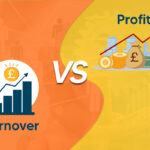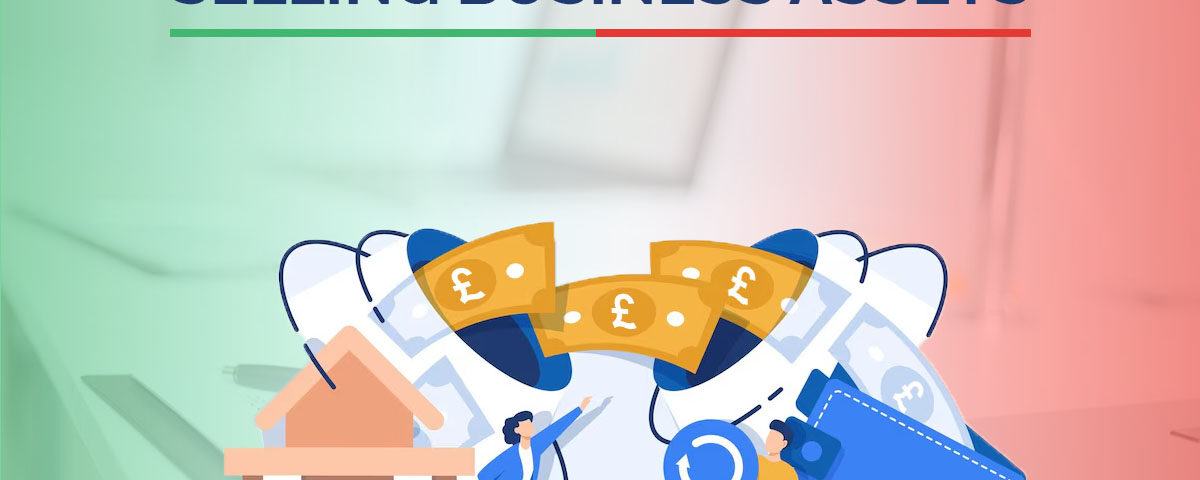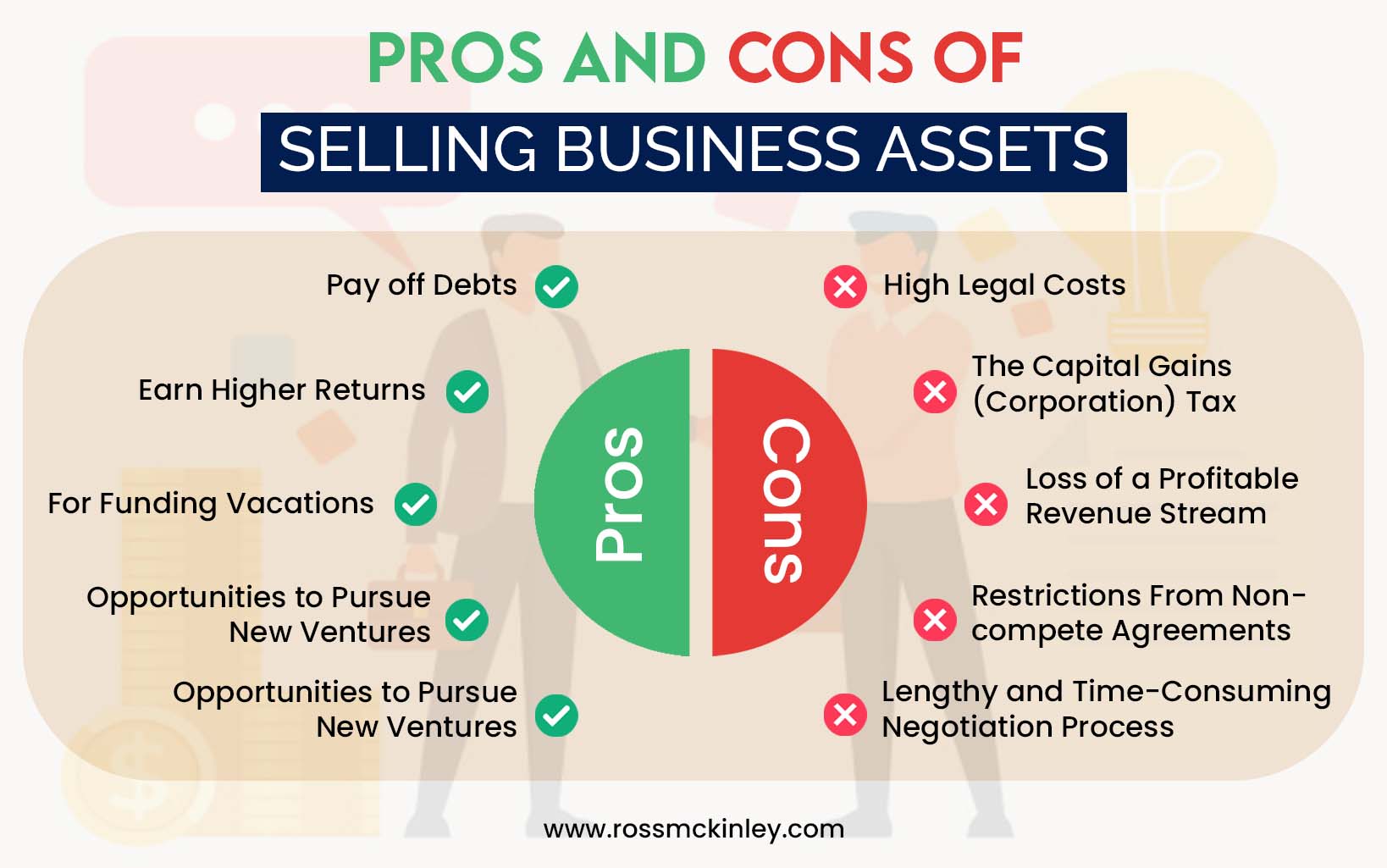
Turnover vs Profit: How Do They Differ?
November 17, 2024
Incorporated vs Corporated: What Are the Major Differences Between Both?
November 19, 2024Pros and Cons of Selling Business Assets

Selling business assets can feel like a tough call, especially when your business faces challenges. Maybe you’re dealing with cash flow problems, a rise in competition, or just need money for reinvesting.
Either way, selling off assets seems the easiest way out of a tough situation. But it’s important to think it through before jumping in because this decision can significantly impact your business.
However, selling assets can give you quick cash and help cut expenses. But you might lose valuable resources and even future revenue streams. Knowing the pros and cons of selling business assets can help you decide what works best.
In this blog, we have discussed the pros and cons of selling business assets so you can make an informed decision that will benefit you in the future.

Table of Contents
What Are Business Assets?
Business assets are valuable items a company contains that can enhance its value and profitability. There are two categories of these assets: tangible and intangible.
Tangible assets, like furniture, buildings, and machinery, have a physical presence and you can touch them. On the other hand, intangible assets, such as goodwill and intellectual property rights, do not have a physical form but still hold significant value.
Understanding how business assets appreciate or depreciate over time is significant when it comes to selling them.
Some items lose value, and selling them might require accounting for depreciation. However, certain assets can appreciate, increasing your returns when sold. Recognizing the type of asset you have helps you make informed decisions about selling it.
| Pros | Cons |
| Pay off Debts Earn Higher Returns Opportunities to Pursue New Ventures For Funding Vacations Helps to Deal with Financial Difficulties | The Capital Gains (Corporation) Tax Lengthy and Time-Consuming Negotiation Process High Legal Costs Restrictions From Non-compete Agreements Loss of a Profitable Revenue Stream |
Pros of Selling Business Assets
Selling assets allows businesses to generate quick cash, which helps in tough times. It also helps streamline operations by eliminating non-essential items, making it easier to focus on important activities.
Ultimately, understanding these benefits can lead to smarter financial decisions and a stronger future for your business.
Here are some pros of selling business assets:
Pay off Debts
One major pro of selling business assets is the ability to pay off debts. You can sell business assets and use that amount to pay for major loans.
This action reduces financial stress and improves your cash flow. When you’re debt free you can focus on growing your business instead of worrying about payments.
Earn Higher Returns
Selling business assets can help you earn higher returns than simply holding onto them. If you have assets that have high value, now is the right time to sell them.
You can use this strategy to benefit their increased value and reinvest in more profitable opportunities.
Opportunities to Pursue New Ventures
Another advantage of selling assets is that it opens doors to pursue new ventures. You can sell off non-essential items, invest in a new business idea, or expand your current operations. Exploring these opportunities can lead to growth and make your company successful.
For Funding Vacations
Selling business assets can even provide extra funds for personal pursuits, like vacations. After working hard, everyone deserves a break, and selling some assets can make that possible.
Imagine being able to enjoy a much-needed getaway without worrying about finances. Personal investment in yourself can recharge your energy and creativity.
Helps to Deal with Financial Difficulties
Finally, selling assets can be a lifesaver when facing financial difficulties. If your business is struggling, selling non-essential assets can provide immediate cash flow.
This step can help stabilize your operations and give you breathing room to plan your next move. Remember, sometimes, letting go can create new paths to success when you sell business assets.
Cons of Selling Business Assets
While selling business assets has benefits, it also has disadvantages. For starters, selling assets often triggers capital gains taxes, so maybe you won’t end up enjoying profits. Additionally, the negotiation process is lengthy and time-consuming.
Here are some cons of selling business assets:
The Capital Gains (Corporation) Tax
One major downside to selling business assets is the capital gains tax. When you sell an asset for more than you paid, you owe taxes on the profit.
Paying tax can significantly reduce your overall earnings from the sale. Therefore, it’s essential to factor this cost before making a final decision.
Lengthy and Time-Consuming Negotiation Process
The negotiation process for selling assets can be quite lengthy and time-consuming. Finding the right buyer and agreeing on a fair price takes effort and patience. The delay can slow down your cash flow when you need it most. As a result, you might feel frustrated during this lengthy process.
High Legal Costs
Another downside is the high legal costs associated with selling business assets. Hiring lawyers and consultants to manage the sale can quickly add up.
These costs can reduce the overall profit you expect from the sale. Sell off your assets only when you have savings to bear such expenses.
Restrictions From Non-compete Agreements
When selling business assets, you may face restrictions from non-compete agreements. These agreements can limit your ability to start a similar business.
This restriction could impact your ability to generate income and limit your professional options. Thus, it’s essential to understand these potential limitations before agreeing to a sale.
Loss of a Profitable Revenue Stream
Finally, selling business assets can mean losing a profitable revenue stream. If the asset contributes significantly to your income, its sale may impact your bottom line.
Such losses are challenging if your business heavily relies on that revenue. Don’t sell your assets unless you have a Plan B or are generating revenue through other ways.
Conclusion
Selling business assets can be a smart move, but it requires careful consideration. We’ve looked at the pros and cons of selling business assets, and it’s clear that while selling can provide quick cash and new opportunities, it also comes with potential drawbacks like taxes and lost revenue. Understanding these factors helps you make the best decision for your business.
Before selling, evaluate which assets are truly necessary. Consider consulting a financial expert to help with taxes and legalities.
Selling only non-essential assets or depreciating items can minimize negative impacts while maximizing your returns. Making informed choices will keep your business on the right path.
